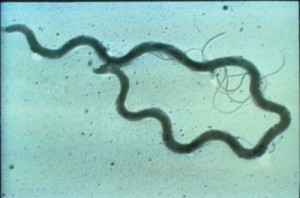What is syphilis?
Syphilis is a serious sexually transmitted disease caused by a bacteria. You don’t have to have intercourse to get syphilis, just contact with an infected sore on another person. Because the sores usually appear on a person’s genitals, syphilis is usually passed through intimate sexual contact. If you don’t get it treated, syphilis can lead to serious health problems and even death. Fortunately, syphilis can usually be cured with penicillin.
What can I do to avoid syphilis?
You can reduce your chances of getting syphilis by using a condom during any kind of intimate sexual contact. But condoms aren’t as good at preventing the spread of syphilis as they are for other sexually transmitted diseases. That’s because syphilis often causes ulcers, called chancres, on the outside of the genitals and condoms usually don’t cover those ulcers. The ulcers are extremely contagious. You can catch syphilis easily if you come into close contact with the ulcers.The best way to avoid getting syphilis or any sexually transmitted disease is to not have sex or intimate sexual contact at all.
How do I know if I have syphilis?
Syphilis usually starts out as a chancre, which is a sore that appears at the place where the syphilis organism entered your body. The chancre often shows up somewhere in your genital area, such as on the penis, labia, or at the opening of the vagina, and appears about 3 weeks after you are exposed to syphilis. Most chancres measure about 1/4 inch to 1 inch across. Because chancres are painless, you may not notice one at all. Even if you don’t get treated for syphilis, the chancre will heal by itself in 2 to 6 weeks, but you still will have the bacteria in your body.
What should I do if I think I have syphilis?
Make an appointment with your health professional to get tested. He or she will do some blood tests, which will check for the syphilis organism in your body. There are several different tests for syphilis. The most common tests are RPR and VDRL. These are screening tests and tell your health professional if you have a bigger risk of developing syphilis. Not everyone who is found to be at risk for having syphilis actually has it. Other blood tests can be used to make the actual diagnosis of syphilis.
If I have syphilis, who else needs to know about it?
Syphilis is a reportable disease. That means that your health professional must report any patients who have syphilis to the NYS Department of Health (DOH). The state keeps statistics for certain diseases. If you have syphilis, the DOH will ask your health provider to speak to you about the names of any people you’ve had sexual contact with recently. The DOH will then tell these people they’ve been exposed to syphilis so they can be treated if necessary. They’ll do it confidentially, which means they won’t use your name, but will simply tell the people that they’ve had sexual contact with someone who has syphilis.Talking to your health professional about your sexual partners might seem horrifying, and you might think twice about getting an exam. But it’s very important that you do. By discussing this with your health professional you’ll help everyone have the information they need to get their syphilis treated. After all, their health might be at risk, and they could also spread the disease.
How do I get rid of syphilis?
Syphilis can be easily treated with a kind of penicillin called benzathine penicillin G. Your health professional must give you a shot of this medicine. If you have syphilis in the early stages, you can be treated with one or two doses of penicillin. If you have syphilis that is more serious, your health professional will give you a penicillin shot once a week for 3 weeks.
What if I have syphilis, but I don’t do anything about it?
You can become very sick if you don’t get medicine for syphilis when the chancres appear. You can eventually have a rash, headache, fever, sore throat, joint pain, and swollen lymph nodes. You can also develop flat, fleshy growths on your genitals or in skin folds on your body. If syphilis remains untreated in your body for a long time, you could develop serious problems in your heart, brain, or nervous system. You could even die.
How do I know if the syphilis is gone?
It is very important to have a syphilis test every three months for one to two years after being treated for syphilis. This is to make sure that the medicine has worked and that no other treatment is needed.
Should my partner be treated for syphilis?
Syphilis is a sexually transmitted disease, so if you have it, it is very likely that your partner also has it. They should see their health professional to get tested. If your partner has syphilis, they will also have to take penicillin. If you’ve had sex with more than one person, you should tell everyone you had sex with so they can get treated.
Who should I talk to if I think I have syphilis?
You should call your health professional whenever you have any sores on your genitals or the surrounding area. If you’re a woman, remember to have a pelvic exam once each year, especially if you are sexually active. During your yearly pelvic exam, your health professional will do a blood test to be sure you don’t have syphilis.



